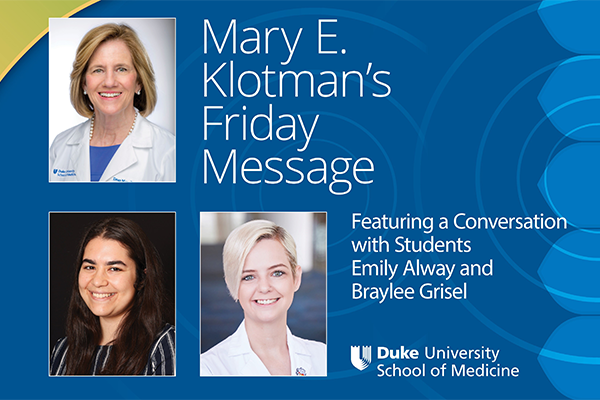Mary E. Klotman's Friday Message & Conversation with Emily Alway, GS3 & Braylee Grisel, MS4
A conversation with Emily Alway, GS3 & Braylee Grisel, MS4 about why they chose Duke, and what advice they have for incoming students.
Young Lives Transformed by Groundbreaking Intestinal Transplants
A team of doctors at Duke University School of Medicine and the National University of Singapore have successfully performed two groundbreaking intestinal transplants. The surgeries were led by Dr. Debra Sudan, a professor of surgery and pediatrics at Duke.
Synthetic Antibiotic Could Be Effective Against Drug-Resistant Superbugs
Decades of work by a series of Duke investigators yields new drug, patents and a startup company
Symposium Highlights Medical Student Research
The medical student research symposium showcases the unique scholarly and research accomplishments of third year students.
Growing Visual Arts and Humanities Curriculum Finds a Home with Duke Medicine Residents
Medical schools across the country are increasingly incorporating visual arts and humanities programming into their curricula to address a variety of issues and skill sets that are relevant to clinical practice such as empathy, tolerance for ambiguity, and resiliency to burnout.
Loneliness Linked to Insomnia Symptoms in Middle-Aged and Older Adults
In a study of 9,430 adults aged 50 and older, researchers found a significant link between loneliness and insomnia symptoms, such as difficulty falling and staying asleep, waking up too early in the morning, and nonrestorative sleep.
Newly Identified Lipid in Breast Milk Might Reduce Cerebral Palsy in Infants
In animal studies, the fat molecule encourages stem cells to generate new cells that produce the brain’s white matter.
One-third of Glaucoma Patients Miss Regular Eye Appointments
Study published in Ophthalmology Epidemiology by senior author Julia Rosdahl, MD, PhD, shows one-third of glaucoma patients stop going to the eye doctor for follow-up care over a 10-year period, jeopardizing their sight.
New Research Casts Doubt on Role of Fungus in Driving Pancreatic Cancer
Duke researchers conducted a multi-pronged analysis of data from the earlier study and found no link between the pancreatic microbiome and the development of pancreatic cancer.
Duke Summer Academy Helps Medical Students Explore Research Careers
The Office of Physician Scientist Development PRIME Summer Academy provides medical students, who have limited research opportunities at their schools, with hands-on research experience at the Duke University School of Medicine.









